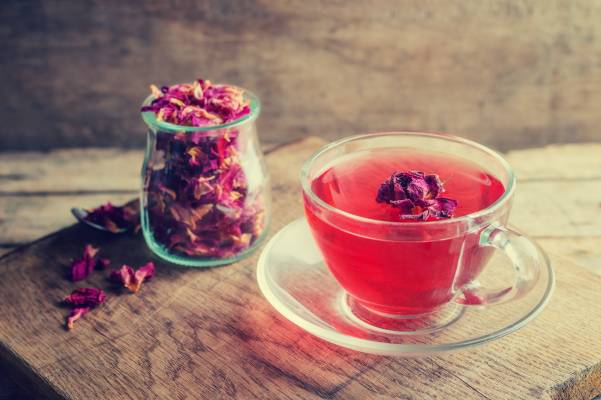Rose tea can be a great break from the tea norm and is not just for the ladies. Rose tea benefits include stress relief and have been shown to help with indigestion, acne, fatigue, insomnia, and headaches. Rose tea benefits are derived from the bioactive compounds in rose hip oil called rosmarinic acid and ursolic acid. Rosmarinic acid may help maintain healthy skin while ursolic acid may help maintain healthy blood vessels and arteries.
Tea Origins:
The rose is a perennial shrub that is native to Eurasia and North Africa. The tea plant was first cultivated in China during the Tang dynasty in the 6th century. At that time, the tea plant was imported from China, introduced to Tibet and then spread throughout Northern India. The first European countries to cultivate tea include Turkey, Persia, Egypt, Arabia and Uzbekistan. The word “tea” was first mentioned in English literature around 1690.
Tea Flavors:
Rose hip tea has a fruity, floral and sweet flavor profile. The rose hip tea blends and flavors will vary due to the different types of rose hips that are used in the tea. Rose hip tea has a light and delicate flavor profile that is not too strong or heavy on your tongue. The rose hip tea is known to have a tart and astringent taste when compared to other teas such as Jasmine and Rooibos.
Tea Chemistry:
Most of the caffeine that is found in rose hip tea comes from Camellia sinensis (Tea). Caffeine is a very potent stimulant that is capable of blocking adenosine receptors in your brain. Adenosine can block the effects of caffeine and this is why you may feel less jittery after drinking tea.
Caffeine Content:
1 oz of Rose Hip tea will contain about 40 mg of caffeine, equivalent to about 2 cups of coffee. Tea types with more caffeine: Darjeeling (3), English Breakfast (3), Earl Grey (3) and Chamomile (4). Rose hip tea benefits are derived from the bioactive compounds in rose hip oil called rosmarinic acid and ursolic acid. These two compounds have been shown to help maintain healthy skin and blood vessels.
Health Benefits Of Rose Hip Tea:
Stress Relief:
Rose hip tea benefits include stress relief and have been shown to help with indigestion, acne, fatigue, insomnia and headaches. Rose hip tea is a great way to enhance the effects of stress reducing herbs like chamomile. It also works great as a natural sleep aid. In fact, studies have shown that rose hip tea is just as effective as prescription sleeping pills in treating insomnia. Rose hip tea benefits may even help lower cholesterol levels.
Indigestion:
Plantago Leaf Extract (in Rose Hip Tea) has been shown to be effective in treating indigestion by reducing the amount of gas released by the body’s digestive enzymes. Tea can also stimulate the body’s digestive system.
Acne:
Rose hip tea is a great remedy for acne because it helps maintain healthy skin and blood vessels. Research has also shown that rose hip tea contains antioxidants that can help prevent free radicals from causing damage to facial cells, which is a major contributing factor to acne. In one study, rose hip tea was used topically to treat acne and showed promising results.
Fatigue:
Rose hip tea benefits include stress relief and have been shown to help with indigestion, acne, fatigue, insomnia and headaches. Rose hip tea is a great way to enhance the effects of stress reducing herbs like chamomile as well as reduce caffeine consumption and help maintain healthy blood vessels.
Insomnia:
Rose hip tea is a great remedy for insomnia because it helps promote healthy sleep patterns. One study showed that rose hip tea can be effective in treating insomnia by promoting relaxation and reducing stress.
Headaches:
Rose hip tea is a great remedy for headaches because it helps promote healthy sleep patterns while providing the body with antioxidants. A study compared the effectiveness of rose hip tea against aspirin and showed superior results for the tea, making it an effective option for headaches. Researchers found that Rose Hip Tea’s calming effects helped reduce muscle tension and enhance relaxation during sleep, which can help relieve migraines.
Heart Health:
Rose hip tea is a great way to promote healthy blood vessels by helping to maintain healthy skin and blood vessels. Researchers have also found that rose hip tea can lower cholesterol levels.
Liver Health:
Rose hip tea benefits include stress relief and have been shown to help with indigestion, acne, fatigue, insomnia and headaches. Rose hip tea is a great way to enhance the effects of stress reducing herbs like chamomile as well as reduce caffeine consumption and help maintain healthy blood vessels. Rose hip contains antioxidants that can help prevent free radicals from causing damage to facial cells, which is a major contributing factor to liver disease.
Conclusion:
There are many benefits to rose hip tea and it can be a great addition to your tea collection. Rose hip tea can also help with many of the same issues as other teas like chamomile and lemon balm. It is a great alternative for those who do not like black or green teas.


